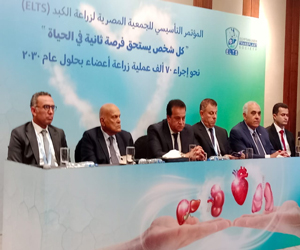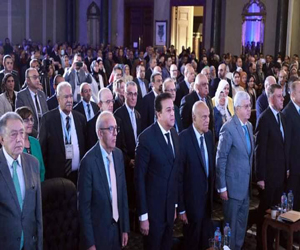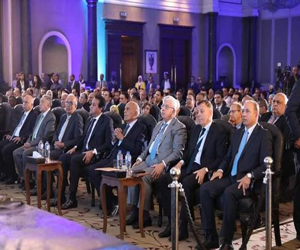The Ministers of Higher Education and Health and the President of Ain Shams University witness the opening of the first international conference on liver transplantation
Prof. Ayman Ashour, Minister of Higher Education and Scientific Research, Prof. Khaled Abdel Ghaffar, Minister of Health and Population, and Prof. Mahmoud El-Meteini, President of Ain Shams University and pioneer of liver transplantation, witnessed the opening of the activities of the first international conference on liver transplantation, which was held for three days, 17-19 November, in Cairo, in the presence of the international surgeon, Dr. Magdi Yacoub, Professor of Cardiothoracic Surgery at the National Heart and Lung Institute at Imperial College London, and Dr. Mohamed Ghoneim, pioneer of kidney transplantation and founder of the Kidney and Urology Center at Mansoura University, and a number of Egyptian university presidents, as well as a group of scientists and doctors in the field of organ transplantation.
At the beginning of his speech, the Minister of Higher Education expressed his happiness at opening the activities of the first international conference on liver transplantation, with the participation of a distinguished group of scientists, researchers and doctors. To discuss modern systems and methods in the field of liver transplantation, and to improve patient care, expressing thanks to those in charge of organizing the conference.
Dr. Ashour praised all efforts to improve patient care, through scientific research, education and international communication with regional and international institutions.
The minister explained that organ transplantation has witnessed changes in the organ donation and transplantation policies that are taking place in Egypt, indicating that it has become necessary to enhance societal awareness of the importance of organ donation, from newly dead people as a new practice that is not applied to organ donation and transplantation in Egypt, pointing to the importance of adopting it to ensure that Organ donation and transplantation is an integral part of the healthcare system in Egypt.
 |
 |
 |
||
Dr. Ashour indicated that university hospitals play a major role in the field of organ transplantation from living donors in the health care system, as university hospitals aim to raise the efficiency of medical services provided to patients, pointing out that there are 10 licensed organ transplant centers in university hospitals in 6 governorates (Cairo - Alexandria - Assiut - Mansoura - Menoufia - Zagazig).
The minister indicated that university hospitals carried out 440 organ transplants during the year 2021, which represents about 25% of the total number of transplants across Egypt, explaining that the ministry works side by side with the Organ Transplant Center at Ain Shams University; To obtain a license as the first Egyptian center for lung transplantation.
In conclusion of his speech, Dr. Ayman Ashour, confirmed that the conference carries with it great hopes for millions of patients who suffer from liver diseases, by presenting the latest ideas, visions, scientific perceptions, and technological applications that have occurred in this field, whether in terms of diagnosis and treatment or in terms of surgery and agriculture, hoping that the conference will come out with results and recommendations equal to the volume the aspirations pinned on it, and contribute to the humanitarian march, and the international efforts for the diagnosis and treatment of liver diseases.
Prof. Khaled Abdel Ghaffar, Minister of Health and Population, stressed during his speech that the political leadership attaches great importance to the file of organ transplantation in Egypt, on top of which is liver transplantation. To establish and equip the first regional medical center specialized in the field of organ transplantation in Egypt and the Middle East with international standards, inside the Nasser Institute Hospital for Research and Treatment, with a capacity of 300 beds, and the center aims to expand in transplant specialties (lung, heart, kidney, liver) and others, pointing out that the center works to consolidate Egypt's position as a regional center in the field of organ transplantation.
He explained that the organ transplant file is a national project in the first place, and its importance is due to preserving the health status of citizens, and achieving the principle of equality in obtaining a good healthy life among citizens, indicating that the Ministry of Health and Population is proceeding according to a mechanism and strategy specific to this file, in accordance with the law No. 5 of 2010 organizing the mechanism of organ transplant work, noting that patients are identified and selected, according to the priorities and health needs of each patient, through the database of the President’s initiative to prevent waiting lists.
The minister also reviewed, during his participation in the conference, the number of local and international operations and statistics. In Egypt, the Egyptian state succeeded in transplanting 600 kidney operations, and more than 300 cases of liver transplantation, in 2021, noting that the first case of liver transplantation in Egypt was in 2001, and a year ago. 1978, stressing that Egypt has great experience and superior skills in this file, which qualifies it to become a regional center for organ transplantation in all specialties.
In his speech, Prof. Mahmoud El-Meteini, President of Ain Shams University and pioneer of liver transplantation, said that organ transplantation in Egypt has been a success story for serving patients with organic failure over the past two decades, despite all the challenges that the practice faced.
Emphasizing that the current organ transplantation law is good and lacks only sound and fair understanding and the activation of the only article that is not activated by it, which is to start transplanting organs from newly deceased donors, indicating that we have the expertise and cadres that qualify us for that, pointing to the need to create the information infrastructure and devote professional dedication Supporting and empowering centers with extensive practice that already exist and are geographically distributed on the map of Egypt, explaining that this is the fair road map that the whole world has followed.
For his part, Sir Magdi Yacoub expressed his great happiness that the Egyptian state had taken real steps towards organ transplantation, as he confirmed that the health system in Egypt possesses superior skills to work with this file, explaining that the organ transplantation file is of great importance, so the necessary research must be provided to assist medical teams. For those working in this medical specialty, pointing out that the process of organ donation is a compassionate culture that has human feelings, and it must be spread among citizens and change the cultures of Egyptian society.
On the sidelines of the conference, a documentary film was shown. To highlight the importance of the organ donation process to preserve the public life of citizens, as a “second chance for life” and to spread the culture of organ donation to save the lives of citizens. A second to survive, by receiving new organs, with the aim of spreading the culture of organ donation, and a number of scientists and doctors have been honored in the field of organ transplantation.
The conference activities dealt with explaining the role and importance of the process of donating and transplanting organs in the survival of peoples, and the participants stressed the importance of sharing and exchanging experiences and scientific research between consultants and specialists in the field of organ transplantation in various countries of the world.
.svg)




